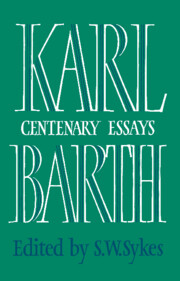Book contents
- Frontmatter
- Contents
- Note on the text
- 1 Introduction
- 2 Karl Barth's eschatological realism
- 3 The triune God and the freedom of the creature
- 4 Authority and openness in the Church
- 5 Ad Limina Apostolorum in retrospect: the reaction of Karl Barth to Vatican II
- 6 The reception of the theology of Karl Barth in the Anglo-Saxon world: history, typology and prospect
4 - Authority and openness in the Church
Published online by Cambridge University Press: 26 February 2010
- Frontmatter
- Contents
- Note on the text
- 1 Introduction
- 2 Karl Barth's eschatological realism
- 3 The triune God and the freedom of the creature
- 4 Authority and openness in the Church
- 5 Ad Limina Apostolorum in retrospect: the reaction of Karl Barth to Vatican II
- 6 The reception of the theology of Karl Barth in the Anglo-Saxon world: history, typology and prospect
Summary
The claim* to authority is the courage to dare, never forgetting the supreme power of God and therefore always mindful of the freedom of conscience, to speak to men in the name of God, with the prophetic ‘Thus saith the Lord’.
If we ask ourselves why it should be that the Roman Catholic Church has been so vitally interested in the theology of an incorrigible twentieth-century Swiss Calvinist, Karl Barth, the answer is very likely to lie in the recovery which his theology made of the idea of divine authority in the Church. That he saw the implications of this recovery from a Protestant perspective is no more than one would expect. The passage which I have quoted from a lecture of 1928 is immediately followed by a reference to Luther and Calvin:
It must not be overlooked, he continues, that Luther and Calvin made the strongest possible claim upon this ‘Thus saith the Lord’ – not for themselves personally but for their work.
And it follows from this remark that if we ask ourselves why it has been possible in the last twenty years for the Roman Catholic Church to become so vitally interested in the theology of the two chief reformers of the sixteenth century, the answer is just as likely to lie in the impetus given by Karl Barth's theological career to recapture the sense of the divine indwelling in the Church which informs so much of their work.
- Type
- Chapter
- Information
- Karl BarthCentenary Essays, pp. 69 - 86Publisher: Cambridge University PressPrint publication year: 1989



